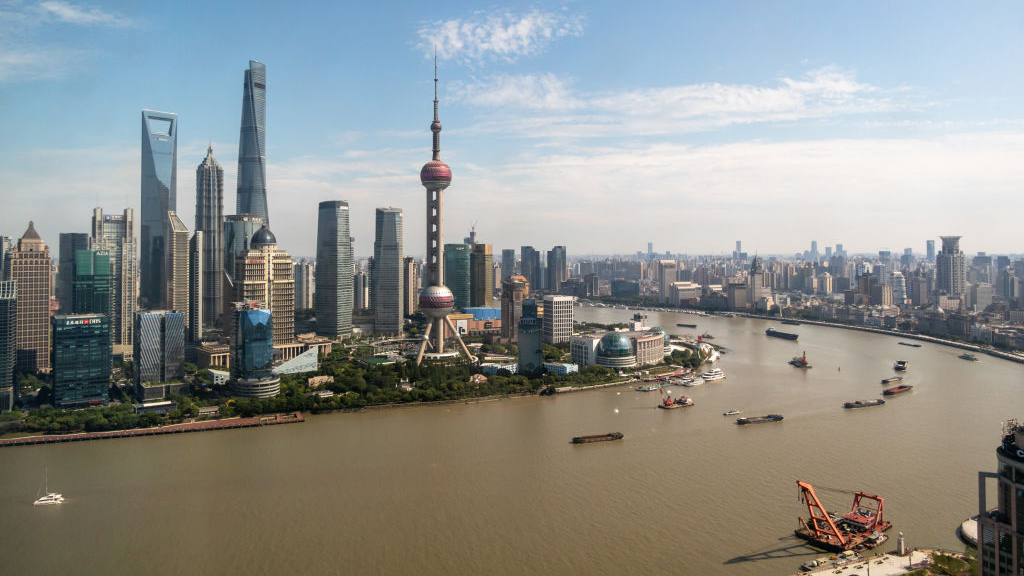
A view of the Shanghai Tower, Oriental Pearl Tower, Jinmao Tower and other super high-rise landmarks along the Bund in Shanghai, China, June 21, 2021. /Getty
A view of the Shanghai Tower, Oriental Pearl Tower, Jinmao Tower and other super high-rise landmarks along the Bund in Shanghai, China, June 21, 2021. /Getty
Editor's note: Dinos Stasinopoulos is a former European Commission official. He is currently a consultant in global economics and governance. The article reflects the author's opinions and not necessarily the views of CGTN.
Over the last two decades, the relative decline of the U.S. and the rise of China has dominated the global governance debate. The West-driven international economic and trade order was based on multilateral systems involving trade liberalization and deregulation, which created mutual dependence and benefited wealth increase and technological development throughout the world.
However, with the shift toward Asia, the global order can no longer be Western-focused because it does not reflect the changing dynamics of geopolitics and trade. China's economy is growing, with its technology sector achieving world-class status.
China has become home to the world's largest and most innovative technology supply chains in artificial intelligence, telecom equipment, high-speed trains, renewals, new energy vehicles and digital payments, to name a few. Many Chinese companies, such as Alibaba, Tencent and the telecom equipment giant Huawei, have become important players in global markets.
China's spectacular economic and technological rise has reinforced U.S. fears of losing its economic and global clout. It has pushed them to erect trade barriers, introduce export restrictions, impose sanctions, limit Chinese investments in the U.S., and blacklist companies that trade with China. This policy aims to encourage U.S. companies to bring their supply chains to the U.S.
The U.S. policy of containing China is creating a trade conflict with a detrimental impact on the global economy. It slows down global trade and diverts attention from urgent environmental considerations.
However, it appears that apart from some success in the manufacturing of telecommunication sector, U.S. efforts are not succeeding since they are self-defeating. The U.S.' efforts have accelerated the trend of increased supply chain regionalization and forced China to redirect trade in Asia and Europe and promote self-reliance and autonomy at the same time.
The limited success of decoupling can be explained by the complexity of global value chains, which imposes important challenges on companies having to balance efficiency objectives with debt and cost reduction. Decoupling may lead to collateral damage at another point in the international division of labor, ripping up existing arrangements and eventually harming both Chinese and Western companies.
Although other Asian countries may gain as regionalization accelerates away from China, the U.S.' efforts are largely self-defeating because they will end harming everybody, as many Chinese companies are making substantial efforts to build "resilient supply chains" and closing know-how gaps without Western technology.

Chinese women wear protective masks as they wait for a flight in the departures area at Beijing Capital International Airport in Beijing, China, March 24, 2020. /Getty
Chinese women wear protective masks as they wait for a flight in the departures area at Beijing Capital International Airport in Beijing, China, March 24, 2020. /Getty
The Huawei conflict has indeed encouraged China to develop its own chip industry, and there is evidence that progress has been made, as innovative Chinese companies are creating new semi-conductor centers in China.
Despite the U.S.' efforts, China remains a strong attraction for value chains because of its growing domestic demand and highly developed manufacturing systems. Recent surveys indicate that 70 percent of U.S. multinationals do not anticipate re-shoring. The two countries' mutual dependence on each other's economies explains the companies' reluctance to reroute their supply chains.
As of today, U.S. companies have $700 billion worth of assets in China and do around $500 billion a year in domestic sales.
In the long run, if this conflict escalates further, it might split the global market into competing technology spheres with different standards and disrupt global trade. The U.S. financial sector is embracing China's financial sector to utilize Chinese savings, indicating that the "disconnect" is not working in the financial sector.
There is no doubt that the U.S.-China economic and trade rivalry is the most important thing of our time where tectonic changes are taking place.
The U.S. is no longer the arbiter of power, and neither does it have the monopoly on the levers of trade, largely due to China's rise. The old multilateral order is being disrupted massively, and multiple bilateral agreements are replacing multilateral frameworks.
There is no doubt that decoupling has encouraged many countries to look for ways to reinforce their technological sovereignty. The regionalization of trade and China's efforts of self-reliance make decoupling ineffective and self-defeating.
This massive disruption requires a new paradigm, with policy objectives reflecting the new trade reality.
The tectonic changes in global trade have outstripped the capacity of nations to manage conflicts and make imperative the convergence process based on international cooperation.
China's new foreign trade policy, the route to Europe, the Belt and Road Initiative (BRI) and the EU's connectivity approach may eventually slow down the global disruption and set the basis for a new order.
It is counterproductive for the U.S. to continue policies aimed at keeping China down and treating it as an adversary. Instead of accusing China, it may make more sense for the U.S. to repair the shortcomings in its own economic system, improve efficiency and compete fairly with China.
Any additional steps the U.S. takes in imposing new trade restrictions will end up sacrificing some of its own advantages and encourage China to become even more self-sufficient in technology sectors.
Since decoupling is premised on a zero-sum game, continuing efforts to decouple would further disrupt the established global balance in economic coexistence and interdependence created to benefit the whole world.
(If you want to contribute and have specific expertise, please contact us at opinions@cgtn.com.)

